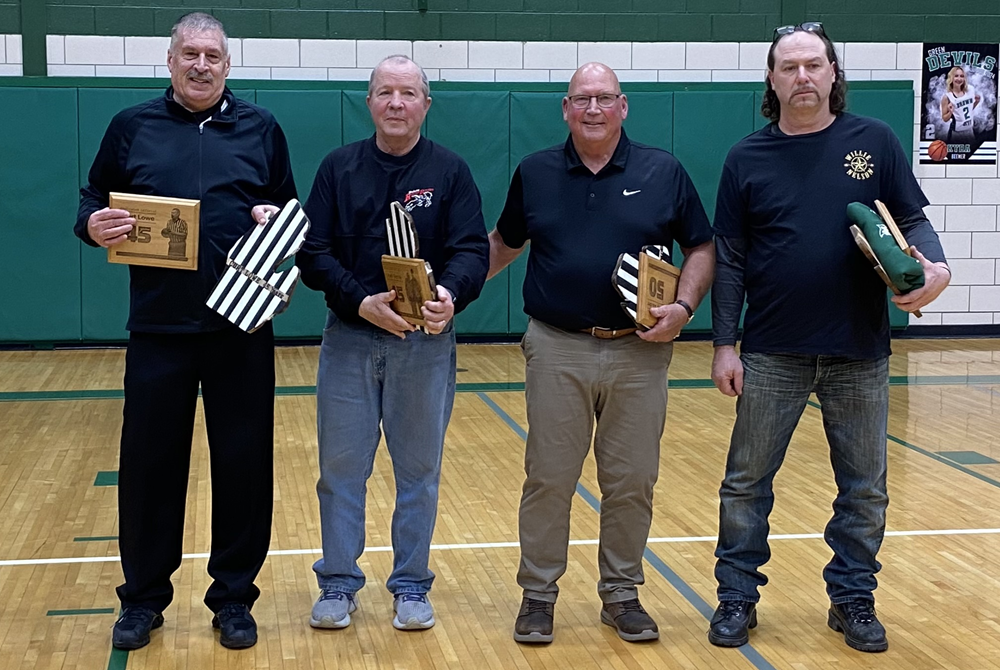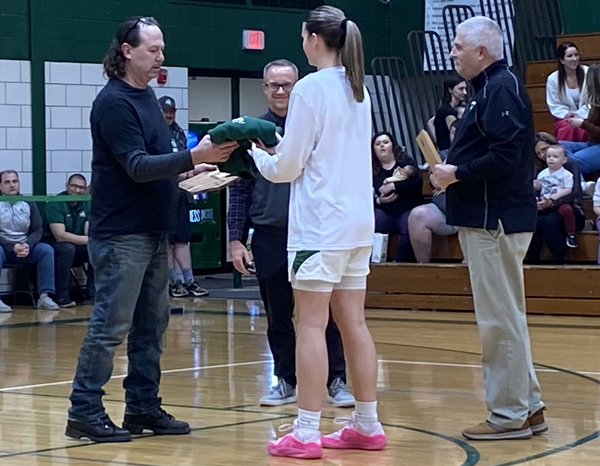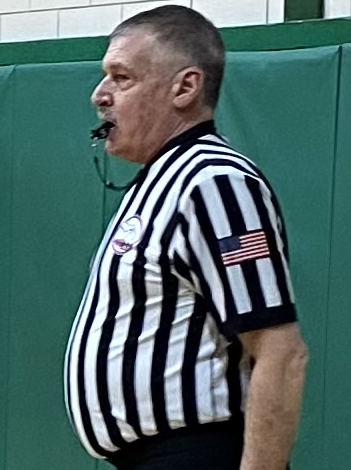
MHSA(Q&)A: NFL official Ronald J. Winter
July 19, 2012
By Brian Spencer
Second Half
 Kalamazoo's Ron Winter has officiated in the National Football League for nearly two decades, and became a referee in 1999. But long before he joined the highest level of the game, he got his start on Michigan's high school fields.
Kalamazoo's Ron Winter has officiated in the National Football League for nearly two decades, and became a referee in 1999. But long before he joined the highest level of the game, he got his start on Michigan's high school fields.
Winter has officiated that sport at all three levels and also high school and college basketball. He's also served as a source of knowledge for officials around the state -- and an example for those hoping to start at the high school level and climb to the pros.
Winter remains registered as an MHSAA official, as he's been for 42 years. An associate professor emeritus of human performance and health education at Western Michigan University, Winter was appointed earlier this month to serve a two-year term on the Governor's Council on Physical Fitness, Health and Sports. The council focuses on increasing physical activity and health improvements.
He served on the WMU faculty first beginning in 1969 and then again from 1992-2008. Winter earned bachelor and master's degrees at Michigan State University.
Did you play any sports in high school or college?
I played football, basketball, baseball, and track in high school. However, once I got to Michigan State University, I started playing lacrosse. A couple guys that lived near me played lacrosse and asked me to come out to throw the ball around. After throwing with them a couple times they asked me to come out for the team. I ended up playing lacrosse for MSU for four years.
How did you decide to choose football as the sport you would officiate?
I started officiating as a student at MSU in their intramural program, officiating touch football and basketball. The next logical step was to then officiate in the high school leagues. From there, I began to proceed to all the different levels.
Are there specific requirements for becoming an NFL official?
The biggest requirement is experience. The progression that I went through went like this:
After officiating high school games, I went to the MIAA (Michigan Intercollegiate Athletic Association). They (MIAA) were looking for people that had 3-5 years of experience at the high school level. From there I went to the Mid-Continent conference. I wasn’t able to go to the Mid-American Conference because I was employed at Western Michigan University.
From there I went to the Big Ten. The Big Ten was looking for people with 5 to 10 years of experience in high school and people that had experience at different positions as an official. I ended up officiating in as a Big Ten football official for 10 years and a Big Ten basketball official for 15 years. I then submitted an application to the National Football League. Coincidentally, the NFL was scouting officials, and had followed me for four years before they finally asked me to be a part of the staff. The NFL decides on who they want to pursue through recommendations and personal interest. They look for personality traits as well as how (officials) carry themselves through different situations.
What has been your favorite level to officiate; High school, college or professional?
I enjoyed officiating all of them, but for different reasons.
I found high school to be the most fascinating because it’s all about the kids; they are playing the game for the love of the game. That is the purest sense of the sport. I loved being involved with kids simply because they love the game.
I found the Big Ten to be most exciting because of the kind of atmosphere that exists on a Big Ten campus on a Saturday afternoon. It’s electric. You don’t get that same sense or the same feel on Sunday afternoon in a pro stadium.
I found the NFL to be most intense. The NFL really has three or four different levels of play during the season. There is preseason play, the first thirdof the season, the second third of the season, and the last five games of the season. Each level is ramped up another notch as the season progresses. Playoffs are entirely different all together. In terms of the intensity and pure speed of the game, there is nothing like the NFL playoffs.
How important is getting along with your fellow officials on the field?
It’s imperatively important if you want to have a smooth and well-run game. This doesn’t mean that you have to buddy-buddy off the field, but on the field you have to be committed to one goal. We spend two or three hours on meetings Saturday afternoon to go over rules tests, tape, and more to prepare for the next game (and) to get over rough patches that develop on a personal level in a previous week. I need to know that the other six guys are focused and thinking about football like me. Everyone has to have confidence in one another. We spend plenty of time on Saturday to get to the point that we need to on Sunday.
What has been the most exciting game you’ve officiated?
I’ve been in plenty of exciting games from NFL playoff games, to the first Orange Bowl game, to the Rose Bowl, to the Division III Hope vs. Calvin basketball game, to when Indiana played Purdue in basketball. All of them were incredible to be a part of. During the Indiana vs. Purdue game, the arena was electric. The players, coaches, fans were intense. Everybody is totally focused on the game. Each coach had a tremendous respect for one another. Neither one wanted to show up or embarrass their counterpart. This game wasn’t that drastically different at the Division III level, however. The intensity of both was very similar.
Are there games that you get excited to officiate more than others, presently?
Not in terms of specific teams. It really just depends on the circumstances, of course. Pittsburgh vs. Baltimore is an intense game. The Jets vs. Patriots game is great. There are clearly rivalries that are very exciting to be a part of. The level of play and intensity of the athletes in the NFL is unmatched and can provide excitement every week.
What is the most difficult aspect of being a NFL official?
I would say that preparation and being able to maintain intensity on the field on Sunday are key aspects. The preparation is difficult because it’s time-consuming. It is a misconception that we simply show up on Sunday to work the game. By the time Sunday rolls around, I’ve spent over 20 hours during the week trying to prepare for a Sunday game. It isn’t hard in terms of physical labor, but difficult in terms of a time commitment. You have to have an understanding family to be in the occupational field that I am in.
Do you have any advice for aspiring officials who hope to make it to the league?
Practice, practice, practice. Be able to work any game at any level and get as much experience as you can. Be a good partner on the field. It takes time; it isn’t something that just happens. Like anything else, it takes practicing your trade to be able to make it to the top level.

Longtime Officials, Statistician Honored for Decades as 'Behind-the-Scenes' Heroes
By
Paul Costanzo
Special for MHSAA.com
February 23, 2024
BROWN CITY – Jerry Sauder thought he was going to be a presenter Thursday night, as his alma mater Brown City was honoring officials Curt Lowe and Joel Venia and school statistician Todd Vandewarker for their decades of service.
 But that was simply a ruse by fellow official Tom Mailloux and Brown City athletic director Tony Burton to get Sauder there to join the ceremony and receive his own award for 50 years as an official.
But that was simply a ruse by fellow official Tom Mailloux and Brown City athletic director Tony Burton to get Sauder there to join the ceremony and receive his own award for 50 years as an official.
With Sauder on the court, 175 total years of involvement with athletics were honored between the JV and varsity Unionville-Sebewaing vs. Brown City girls basketball games. Sauder spent 50 years as an official, Lowe and Venia 45, and Vandewarker has spent 35 years as a statistician, all across multiple sports.
“Tonight, we gather to pay tribute to those whose steadfast dedication has woven the fabric of excellence into the tapestry of Michigan high school athletics,” Brown City principal Brad Hale said to kick off the ceremony. “It is with profound gratitude that we extend our heartfelt appreciation to the unsung heroes behind the scenes – the pillars whose tireless efforts ensure that each game unfolds seamlessly, each moment etched with the spirit of sportsmanship and fair play. … Tonight, we shine a spotlight on a few whose commitment spans decades, illuminating the path for generations of athletes to follow.”
Sauder’s 50 years as an official included 25 as a Division I college basketball referee. He is currently working in an administrative role with Elite Officiating, overseeing officials in the Michigan Intercollegiate Athletic Association, Great Lakes Intercollegiate Athletic Conference and Wolverine-Hoosier Athletic Conference. He’s officiated NCAA Tournament games and contests around the world after getting noticed at a camp at Western Michigan University.
“I’ve always said I’m the luckiest guy to put on a shirt,” he said. “I was fortunate enough to be selected to be given the opportunity. There’s a lot of guys that could have, but weren’t set up to do it at that time.”
During his time as a high school official, Sauder reffed MHSAA Finals for basketball and football. He also spent time officiating baseball and softball games.
He began officiating when his best friend Jim Seidell, a longtime coach and administrator in Brown City, convinced him to start. Sauder knows his path isn’t a common one, and that it’s not easy to convince people to get into officiating. But with perseverance, opportunities are available.
 “There’s a dire need right now,” Sauder said. “We’ve got to do something because if we don’t, high school sports as we know it is going to suffer. … I was fortunate to have good people around me that mentored me. Kids start, they last a couple years and they walk away from it. They don’t pay enough money to get yelled at like people go at you now. I don’t blame the young people.”
“There’s a dire need right now,” Sauder said. “We’ve got to do something because if we don’t, high school sports as we know it is going to suffer. … I was fortunate to have good people around me that mentored me. Kids start, they last a couple years and they walk away from it. They don’t pay enough money to get yelled at like people go at you now. I don’t blame the young people.”
Lowe, who officiated Thursday night’s JV game before the ceremony, got his start thanks to Sauder and Seidell. Also a Brown City graduate, Lowe’s 45 years of officiating include multiple assignments at MHSAA Football and Basketball Finals. He’s also been on the court for women’s college basketball games.
“Officiating is like family,” Lowe said. “I have met so many people – wonderful people. And, over 45 years, it’s been a ton.”
While he’s worked plenty of games in the Thumb, much of Lowe’s time as an official was spent in the Saginaw and Flint area, where he was able to officiate games featuring some of the state’s greatest athletes, including Mateen Cleaves, Draymond Green, Mark Ingram and the late Charles Rogers.
“Those were the best games, and Jerry got me in there,” Lowe said. “That was the best ball ever. It was just amazing to watch.”
Lowe’s crew Thursday night included a pair of younger officials who later officiated the varsity game with Mailloux. Lowe thinks it’s a great opportunity for athletes who want to stay connected to sports.
Venia’s start in officiating was more by happenstance. He was working the scoreboard for rec basketball games in his hometown of Marysville, and one day needed to fill in as an official. After reffing the game, he made $10 as opposed to the $5 he got for running the scoreboard, and made the move.
He’s still doing football games but is no longer on the basketball court or softball or baseball diamonds.
“It’s probably the contacts you make in the little towns,” Venia said about what has kept him in the officiating business. “I go down to the Macomb area and do that. In football, we always take five games up in the Thumb. I know so many people up here. With the kids, it keeps you younger, keeps you moving.”
Like Sauder and Lowe, Venia has officiated multiple MHSAA Football and Basketball Finals.
 He played football, basketball and baseball in high school, and thinks that experience can be “tremendous” for future officials. But he was quick to point out that those who don’t have that experience can also thrive.
He played football, basketball and baseball in high school, and thinks that experience can be “tremendous” for future officials. But he was quick to point out that those who don’t have that experience can also thrive.
“I’ve worked with a couple guys that never played,” Venia said. “(Mailloux) never played football, but he’s a good football official. I mentored a guy that never played basketball, Jordan Stevens, who is the softball coach at South Dakota State. He never played basketball, never played football, but he was a very good official. I think it gives you an advantage, but by no means is it a barrier if you haven’t played.”
The person with the best seat in the house as Sauder, Lowe and Venia have run up and down the court or football field in Brown City has been Vandewarker, who was celebrated for his decades of service as a statistician.
When asked how he got started, he pointed at Burton.
“That guy suckered me into it,” Vandewarker said with a laugh.
Vandewarker was himself a Brown City athlete, competing in football, basketball and track. Over his more than three decades keeping stats, he’s seen several great Green Devils and opposing athletes – so many that he couldn’t narrow them down.
“A couple thousand (games),” he said. “I’ve seen some stuff, I’ve seen some good stuff. A lot of good players. Too many memorable ones to mention, I guess. I’ve seen the best of the coaches and heard everything they have to say. Best of the refs – I was in high school and Jerry Sauder was reffing my games.”
At that point, Vandewarker had to step away and start the pregame clock for varsity warm-ups. But when he came back, he had an idea of how long he may remain at the center of Brown City athletics.
“I always said as long as Tony and Cindy (Burton, Brown City’s assistant AD) were around,” he said. “But I don’t know. I’ll probably go for another 10-15, put a good 50 in. I think I got that in me, still.”
 Paul Costanzo served as a sportswriter at The Port Huron Times Herald from 2006-15, including three years as lead sportswriter, and prior to that as sports editor at the Hillsdale Daily News from 2005-06. He can be reached at [email protected] with story ideas for Genesee, Lapeer, St. Clair, Sanilac, Huron, Tuscola, Saginaw, Bay, Arenac, Midland and Gladwin counties.
Paul Costanzo served as a sportswriter at The Port Huron Times Herald from 2006-15, including three years as lead sportswriter, and prior to that as sports editor at the Hillsdale Daily News from 2005-06. He can be reached at [email protected] with story ideas for Genesee, Lapeer, St. Clair, Sanilac, Huron, Tuscola, Saginaw, Bay, Arenac, Midland and Gladwin counties.
PHOTOS (Top) From left: MHSAA-registered officials Curt Lowe, Joel Venia and Jerry Sauder and Brown City statistician Todd Vandewarker stand together as they are celebrated Thursday at Brown City. (Middle) Vanderwarker receives his award for 35 years as a school statistician. (Below) Lowe refs the junior varsity game before the recognition ceremony. (Photos by Paul Costanzo.)

